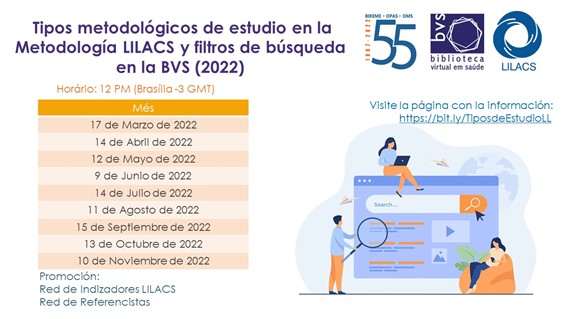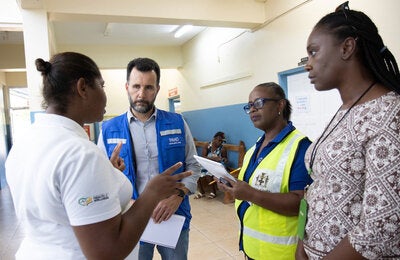
16 May 2022 — In an infodemia and misinformation reality, managers, health professionals, and patients seek reliable scientific information in the format and language needed for intervention through evidence-based policies and practices. Moreover, the adoption of mechanisms that provide transparency and reliability of research are in line with the practices of open science, which BIREME has been preparing to adopt in its products and services.
Randomized controlled trials, systematic reviews, meta-analyses, health technology assessment studies, observational studies, economic evaluations, rapid reviews, policy briefs, clinical practice guides, and other specific types of studies are methodological types highlighted by their degree of recommendation, strength of evidence or for their systematization and translation of scientific knowledge.
To facilitate and improve access to these documents, the coordinators of the LILACS Indexers Network and the Reference Network developed a joint action to create technical notes on the indexing of study types, methodology for validating search filters and training for the LILACS and VHL networks and those interested in the topic.
The indexing of documents and methodological types
The thematic indexing of a document is the synthesis of the main contents discussed, the study design, its methodological and technological aspects, and the subjects involved in health research. These subjects are represented by descriptor terms from the controlled vocabulary Health Sciences Descriptors (DeCS/MeSH).
The availability of descriptors and the consistent application of the LILACS Methodology impact the representation and retrieval of researched and published subjects in a subject area and its specialties.
Specifically, it was identified that some necessary methodological types did not exist or, if they did, there were doubts and cases of inconsistency in their application.
As part of the strategy to solve this issue, technical notes were developed and are being reviewed and published in the LILACS Methodology document indexing manual for the following types of studies: Clinical practice guidelines; clinical trials; qualitative research; systematic review; cohort studies; reviews; case and control studies; cross-sectional studies; validation study; evaluation studies; health economic evaluation; health technology assessment; and evidence synthesis.
Validation of search filters
A validated search filter has more credibility once the search through it is reproducible and based on evidence and solid methodologies for its construction.
From a content point of view, the validation of these filters has a big impact on the researchers who use them in their studies. For example, the Controlled Clinical Trial filter is one of the most used for Systematic Reviews; the Systematic Reviews, Evaluation Studies, and Guidelines filters are commonly used to inform political or clinical decisions.
From a technical point of view, a well-constructed and validated search filter impacts on all products and services that consume data from the VHL search system, as well as the VHL instances themselves, the evidence-guided search EVID@Easy, e-BlueInfo, and others.

With information professionals in mind, we sought to train and update professionals in the methodologies and search resources in the VHL and other information systems.
The process for validating each type of study was carried out during the year 2021, counting on specialists in the two areas of indexing and research, according to the following steps:
- Research and evaluation of reference documents of strategies validated by research organizations in other international information sources
- Adaptation of the reference strategies to the VHL parameters;
- Adjustment of the strategy according to the recommendations of the indexation note (produced by the LILACS methodology);
- Testing, adjustment, and evaluation of results in the VHL search interface;
- Registration of the applied methodology in the Manual Search filters for methodological types of study in LILACS Methodology that will be available soon;
- Updating the strategies in the repository of search strategies with link to the methodology page;
- Updating the processing of the study type filter in the VHL search interface.
We are currently finalizing steps 5 through 7 for the fifteen types of studies that have been validated. By the end of 2022, we hope to meet the training schedule and complete all the steps of this important work that contributes to the transparency and visibility of health research.
Training on methodological types of study
The series of ten training courses for the LILACS Indexers and Reference networks on Methodological types of studies in LILACS Methodology and search filters in the VHL began on March 17, with the objective of providing the professionals with adequate resources to identify, index, and retrieve the main methodological types of studies in the databases that adopt the LILACS Methodology, extendable to other sources of information, such as the MEDLINE database, that apply the same logic for document retrieval.

This series was created based on the 13 technical notes for indexing and 15 records of the methodology for validating the filters applied in the VHL for retrieving the methodological types of studies.

To date, two sessions have been held, the first on clinical practice guidelines and the second on health technology assessment. The participation in both sessions totaled 110 participants from 14 countries, which indicates a potential for expanding participation through the dissemination of the new training to be held.
It is considered that the cooperative action between the two networks (Indexers and Reference) is essential for the visibility, access to, and use of these types of studies, because they are areas that, when synchronized, provide consistent description and retrieval. We consider that these actions are only the beginning of a fruitful partnership in favor of policies and practices based on scientific evidence applied to health services in Latin American and Caribbean countries.



